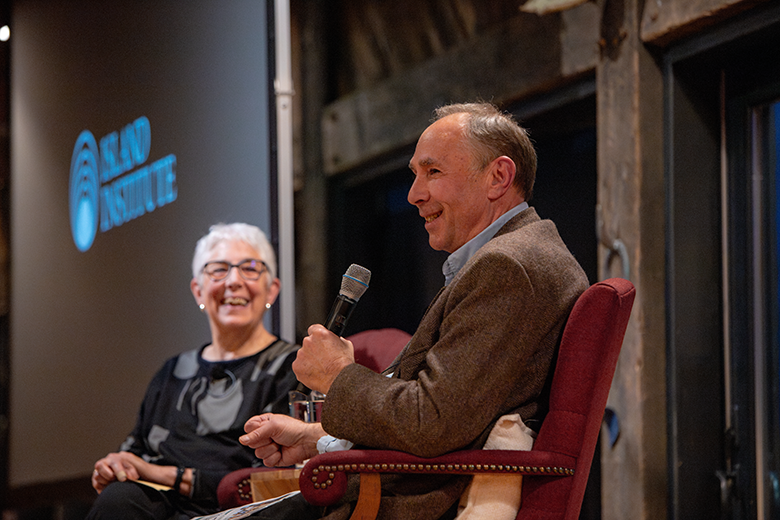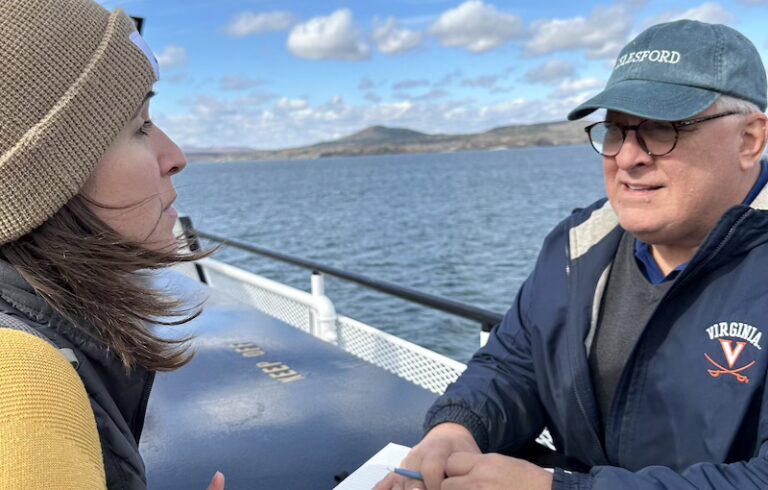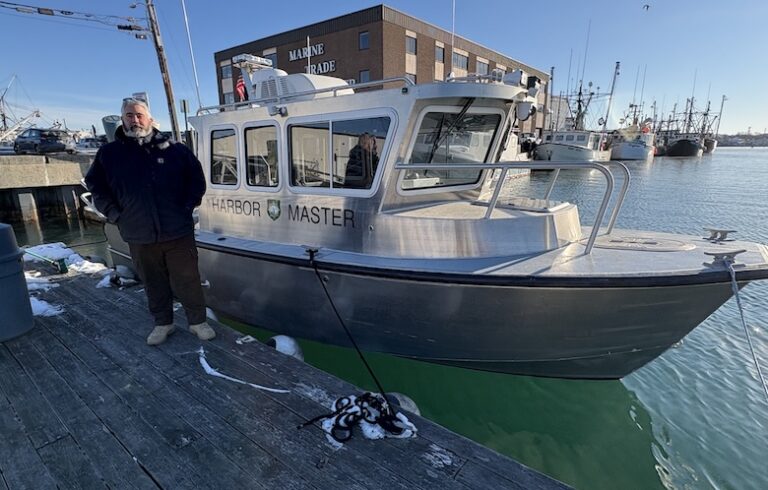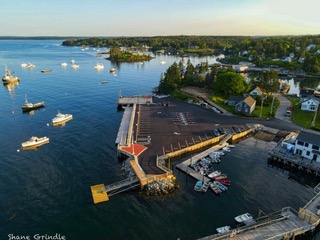An Oct. 30 event honoring Tom Groening, the retiring editor of The Working Waterfront and Island Journal, was as much a toast to his own career as it was an uneasy reflection on the important but precarious role journalism plays in the world.
The event opened with remarks by Colin Woodard, an author and journalist who began his career as a foreign correspondent in Eastern Europe and the Balkans around the collapse of the Soviet Union before returning to the U.S. and writing for publications including The Working Waterfront and Portland Press Herald.
The program then featured a conversation between Robin Alden, the founder of Commercial Fisheries News and a former commissioner of Maine’s Department of Marine Resources, and Groening, who spent years at local Maine newspapers before coming to Island Institute slightly over a decade ago.
“You can rebuild journalism from the ground up and people are doing it, you know, nimble online newsrooms.”
While the journalism industry faces real threats, all three speakers argued that it remains a force for good that can do everything from informing citizens in struggling democracies, to presenting the science behind different industries, to simply marking community milestones such as births, deaths, and which kids made the dean’s list.
Some 150 people attended the event, which took place at Bayview Point Event Center in Belfast and was titled “Trust in Community Journalism.”
At one point, the presenters were asked what they’re most passionate about in journalism.
Groening named several things, including analysis pieces that go deeper to explain the stakes behind different stories, as opposed to “stack[ing] up facts” and leaving readers to “figure it out.”
On a simpler level, Groening said he likes getting to write about ordinary people who “never would show up in the paper, and then you do an interview with them, and you profile them, and you know, you listen and you really hear their story and what they’re about. That feels good.”
Groening got laughs when he recalled a reaction he once received to an editorial piece he’d written for the Republican Journal in Belfast—now part of the Midcoast Villager—endorsing a slate of candidates for City Council.
“Someone came up to me, I won’t mention his name, and said ‘Thank you for writing that. I take that into the ballot booth and I go opposite every one of them,’” Groening said.
Alden recalled starting Commercial Fisheries News while living in the Stonington area 53 years ago, based on her belief that commercial fishing, when done properly, can support the environment and help communities to thrive. The idea came after she overheard an argument between an oceanographer and a shrimp fisherman.
“They both knew what they were talking about, and they could not hear each other,” she said. “… I saw that what was missing was connecting everybody’s different types of knowledge and building understanding.”
On a more wistful note, Alden told the crowd that Commercial Fisheries News would be publishing its final issue in December.
Woodard, who now runs the Nationhood Lab at Salve Regina University’s Pell Center in Rhode Island, painted a dire picture of the news industry.
“I guess you would call my talk ‘the fall of journalism and what we might do to rebuild it,’” he said at the start of his remarks.
After growing up in Maine, Woodard started his journalism career as a foreign correspondent before moving back to the U.S. and shifting to national and state reporting. He noted that changes in the journalism industry have forced many newspapers to eliminate all those types of positions. Among the challenges have been the growing availability of classifieds and other information online, and new owners and investors who have slashed what they see as the least profitable parts of news organizations.
The result has been once-robust regional papers that now put out a fraction of the original reporting they once did and instead rely more on contributed material from wire services such as AP.
“And as these papers disappear, and then other entities, broadcast media, radio, 60 Minutes, you know, all vanishing very rapidly,” Woodard said. “So that’s a terrible thing for democracy.”
But Woodard and the other speakers also pointed to new business models—many of them nonprofit organizations such as The Maine Monitor, Harpswell Anchor, and Peaks Island News—that could help fill the growing gaps in traditional reporting. The Monitor, for example, has just launched a local reporting initiative that’s covering rural western and Downeast Maine.
“You can rebuild journalism from the ground up and people are doing it, you know, nimble online newsrooms,” Woodard said.
During a question-and-answer session, Jo Easton, director of development at the Bangor Daily News, offered a hopeful assessment for the local news landscape in Maine and said colleges and universities here could follow those in other parts of the country that have enlisted student journalists to plug reporting gaps.
In Groening’s last column as the editor of The Working Waterfront, he expressed his admiration for two of the nation’s best-known journalists: Bob Woodward and Superman.
To that end, Island Institute President Kim Hamilton concluded the Belfast event by presenting Groening with a gift: his own version of the Man of Steel’s red-and-yellow cape.





